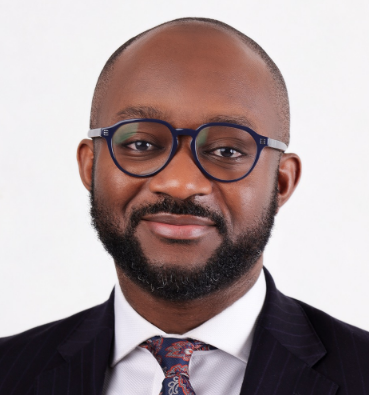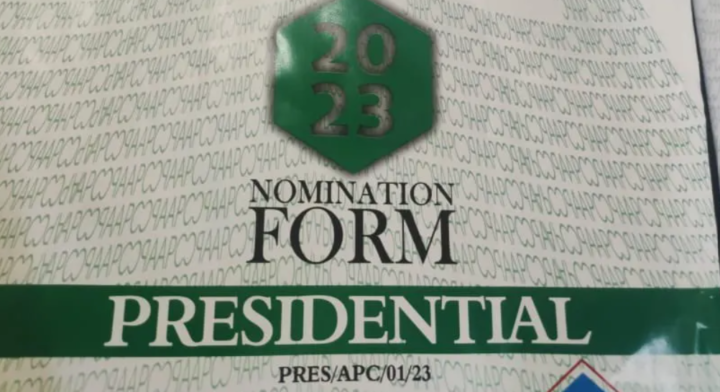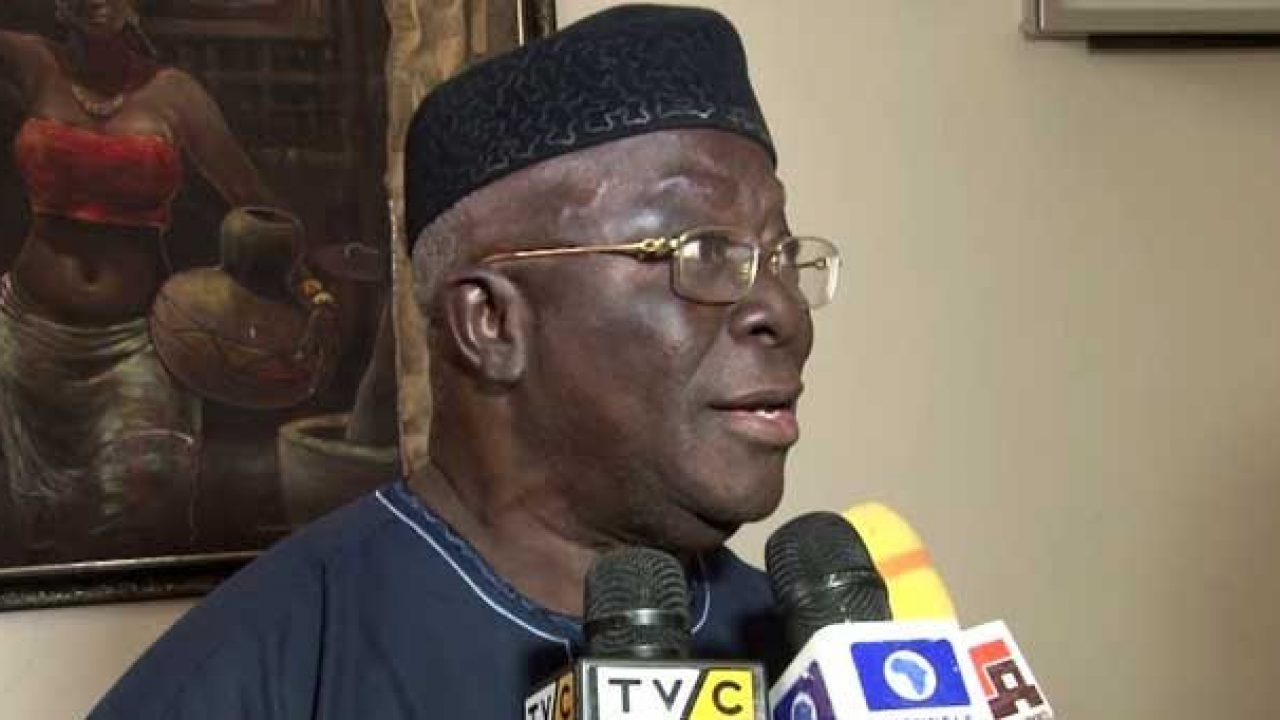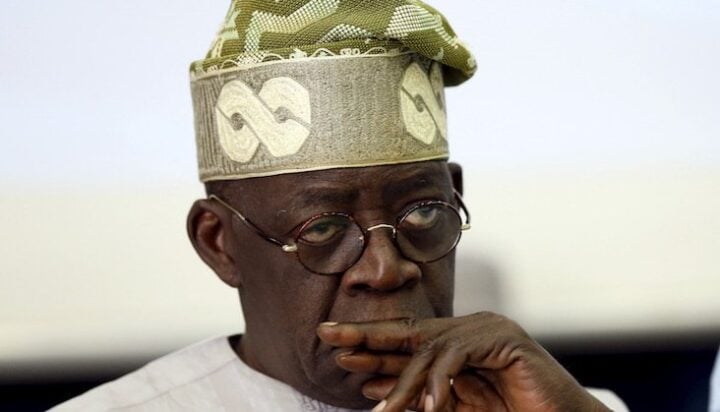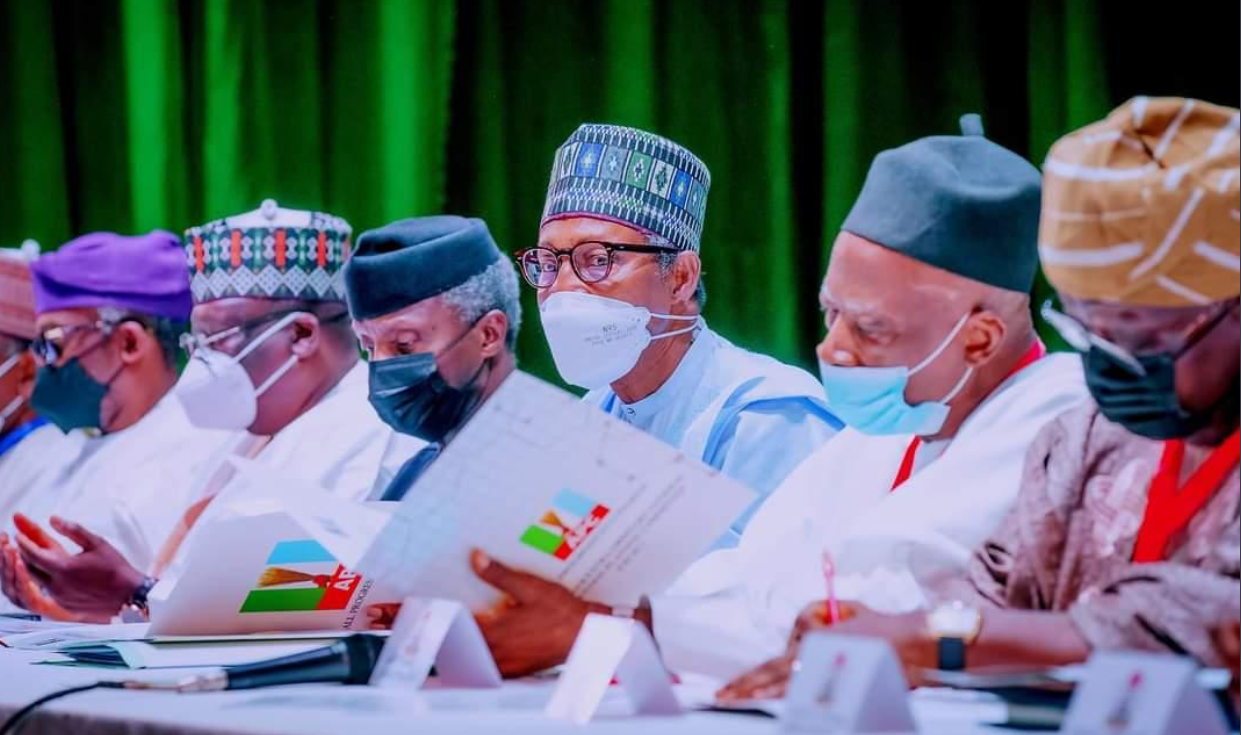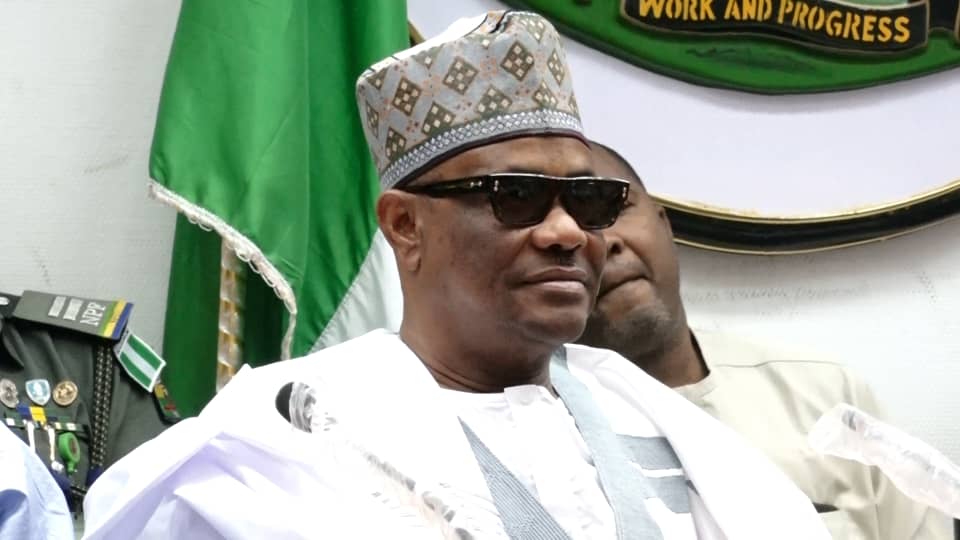“The membership of the national assembly is an investment because most of us sold our houses to get to the senate… the maturity is there but it is the ability to recoup whatever you spent legitimately that is the problem” – Adolphus Wabara, former senate president.
“For political parties, the sale of nomination forms is vital for operational revenue. Additionally, political parties use the high cost of nomination forms to screen candidates and reduce the practice of aspirants playing spoiler or using the process as an opportunity to negotiate their personal ambitions” – Rt Hon Femi Gbajabiamila, speaker of the house of representatives.
It is glaring from the high cost of nomination fees imposed by Nigerian political parties that the commercialization of politics is fast becoming an indelible feature of Nigeria’s political culture. The ruling All Progressives Congress (APC) fixed the cost of nomination forms for president at N100 million ($240,884), governorship at N50 million ($85,470), senate at N20 million ($34,188), house of representatives at N10 million ($17,094) and state assembly at N2 million ($3,418).
The leading opposition party, the People’s Democratic Party (PDP) pegged N40 million ($68,376) as the cost for presidential nomination forms, N21 million ($35,897) for governorship, N3.5 million ($5,982) for senate, N2.5 million ($4,273) for the house of representatives and N1.5 million ($2,564) for state house of assembly.
Advertisement
While the two main parties introduced concessions for women and a 50% discount for young aspirants, aspirants are still subject to paying other high sundry fees for administrative costs and state secretariat fees before nomination forms are submitted for processing. Unfortunately, these pre-primaries’ expenses represent a small fraction of the cost of politics.
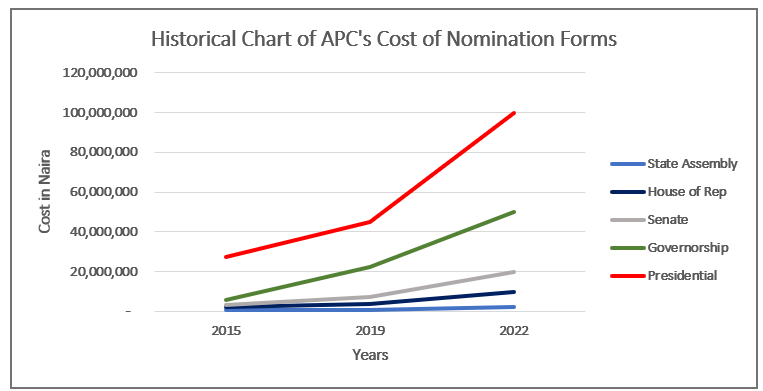
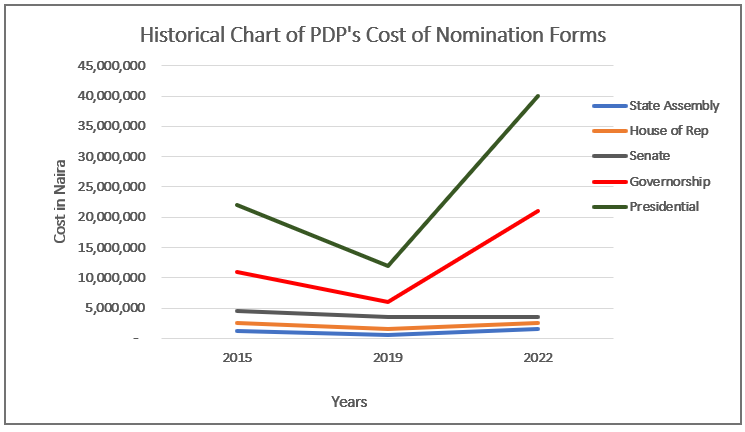
Advertisement
The outrageous cost of nomination forms reinforces three axiomatic propositions. First, the manner with which political parties increase the cost of nomination forms with sybaritic excitement reinforces political parties as rent-seeking enterprises with no regard for inclusive democratic participation. Second, it affirms the dearth of ideological variations amongst Nigerian political parties. In other words, virtually all the parties subscribe to the view that money, being ‘the mother’s milk of politics’ should define leadership recruitment. And lastly, the antidote to the evolution of a plutocratic state rests squarely on a comprehensive and meaningful political finance reform that encompasses political party finance and campaign finance.
Fair competition is the hallmark of candidate recruitment in political parties. Imposing high costs on nomination forms limits accessibility to political entrepreneurs with deep pockets and wide patronage networks, thereby shrinking the political space. When money shapes politics, it assaults the democratic right of citizens to contest for public office, especially where it determines who qualifies to participate in politics. As the Chairman of Nigeria’s ruling party noted; “if you don’t have N100 million, you have no business with becoming president”. The implication is the evolution of a state that is governed and exists to serve wealthy elites at the detriment of popular participation. Inertia towards electoral participation is a knock-on effect of a commercialized political process that most politicians tend to ignore.
As long as money, not competence, character, or popular appeal, operates as a fundamental variable in leadership recruitment of political parties, voters will refrain from voting because commercialized political processes are more likely to produce unpopular, unaccountable, and incompetent candidates. Needless to say, a highly monetized process hamstrings the political aspiration of youth and women and infringes on the spirit behind the Not Too Young To Run act.
To a large extent, the justification advanced by political parties for the high cost of nomination forms is implausible. Political parties claim that the high monetary value placed on the nomination forms is a due diligence measure to distinguish pretenders from contenders. To the parties, it is a parameter for measuring interest, seriousness, and commitment to contest for office. In the absence of state funding of parties, parties generate revenue from the sale of forms to fund party activities. In a recent interparty dialogue in Abuja hosted by Action Aid Nigeria, Yiaga Africa, and PERL, some parties argued the exorbitant cost of forms is attributed to inflation.
Advertisement
The reliance on the high cost of nomination forms as a due diligence measure indicts political parties for failing to invest in long-term leadership recruitment, development, retention, and transition. If parties maintain consistent, inclusive, and structured engagements with party members on policy, leadership, and governance, it will address the leadership recruitment question. Through strategic engagement opportunities, the leadership philosophy and values of political parties can be espoused and inculcated into party members ahead of the electioneering season. Prospective contenders can be identified, groomed, and empowered to contest for party nominations. It is counterproductive for political parties to wait for the election commission to ring the election bell before engaging in leadership recruitment. The true test of a party’s commitment to decommercializing politics is its long-term leadership recruitment approach and strategy.
Furthermore, the over-dependence on revenue from the sale of nomination forms to run party affairs exposes the poor health of political parties. Ideally, political parties fund candidates, but the reverse is the case in Nigeria, where candidates fund political parties. Political parties cannot generate revenue through membership dues, levies, and donations hence the high cost. The removal of state funding for political parties in 2010 sanitized the political finance ecosystem; however, the introduction of private financing such as membership dues and in-kind donations has not been effectively explored by political parties for a plethora of reasons.
First, most parties fail to maintain an accurate, credible, and updated register of members, making it impracticable to mobilize membership dues and levies. In the past, parties were funded through membership dues and levies, but in contemporary Nigerian politics, the preference of party leaders is to generate ‘quick money’ during party primaries. This condition serves the interest of godfathers and moneybags because it makes party leaders subservient and captives of entrenched interests or financiers of the party, leading to the ‘political capture’ of the electoral process—secondly, weak internal control mechanisms and poor organizational culture in parties.
Political parties have been indicted several times by the electoral commission for failure to maintain proper financial records, fixed assets register, and undertake periodic audits of accounts. Without a proper financial management system, political parties can’t mobilize, manage and retire private funding with a high degree of transparency, accountability, and compliance with political finance regulations.
Advertisement
Scrutinizing inflation and the basis of cost of party presidential nomination forms
Nigeria’s inflation has maintained an upward trend from 2015 to 2022. According to data from the National Bureau of Statistics (NBS) and the Central Bank of Nigeria (CBN), in December 2015 inflation rate was 9.55%, increasing to 11.98% by December 2019 and to 15.92% in March 2022. The rate of change in inflation from 2015 to 2019 was 2.43% and 3.94% from 2019 to 2022. This implies that inflation increased by 25.45% between 2015 and 2019 and by 32.89% between 2019 and 2022.
Advertisement
If inflation is the supposed basis for the increment in the cost of nomination forms, the cost of APC forms in 2022 should be N59.8 million, not N100 million. For the PDP, the cost of the nomination form for 2022 should be N15.96 million, not N40 million. Based on the logic of inflation, the cost of APC and PDP presidential forms in 2019 using the change in inflation from 2015 would have been N36.56 million and N29.26 million, respectively. This implies that the PDP sold the presidential form below the inflation-adjusted cost in 2019, while the APC sold above.

Advertisement
In 2019, APC sold by more than 23% of the expected cost (inflation-adjusted), while the PDP sold by 59% below the expected cost. For the 2023 presidential election, the APC is selling by 67% more than the expected cost, while the PDP is selling more than 151% of its expected cost. Linear computation (N40 million divided by N30,000 minimum wage) also shows that the over-priced amount of the PDP presidential form can pay the minimum wage of 1,333 workers, based on the N30,000 minimum wage.
Evidently, inflation is not necessarily the driving force behind the jerked-up prices of the nomination forms. Therefore, the electorates should question the astronomical change in the cost size of the APC and PDP form for the 2023 election. The share increase in the cost does not reflect Nigeria’s socio-economic reality, as data from the National Bureau of Statistics (NBS) and the World Bank show that Nigeria’s poverty headcount increased from 39.1% before 2019 to 42% in 2020/2021. This translates to 82.9million Nigerians living below the poverty line before 2019 to 89 million in 2021.
Advertisement
The World Bank projects this proportion will hit 42.6% by the end of 2022 (i.e., 90 million Nigerians in poverty). The insensitivity to the prevailing socio-economic situation makes the candidate selection process susceptible to capture by money bags. It is, therefore, an uphill task for aspirants to mobilize financial contributions from an impoverished population if the suggestions from party leaders that aspirants should solicit donations from their supporters are to be taken seriously.
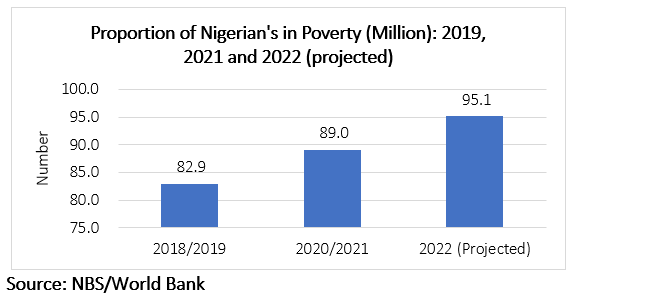
The current funding model of political financing creates unfair competition and shrinks the political space to the detriment of competent leaders, youth, and women. Political finance reform is an urgent necessity to ensure the political space is accessible to all persons regardless of age, economic class, tribe, and creed. Any meaningful reform of party funding or campaign funding should deliver the following four key outcomes; first, limit the influx of unregulated money in the political process; secondly, enhance the capacity of political parties on resource mobilization and maintenance of proper account of financial transactions and assets register; thirdly, strengthen INEC’s capacity to monitor and ensure compliance with political finance regulations and; fourth explore new pathways of candidate selection that de-emphasizes the place of money and economic power over competence, capacity and character. The net effect of these outcomes will be improved safeguards for the political space, party supremacy, and candidate recruitment.
Itodo, an election, democracy and public policy enthusiast, serves as the executive director of Yiaga Africa and the convener of the Not Too Young To Run movement. He serves on the boards of the International Institute for Democracy and Electoral Assistance (IDEA) and the Kofi Annan Foundation. Please send comments and feedback to [email protected]. He tweets @DSamsonItodo
Views expressed by contributors are strictly personal and not of TheCable.
Add a comment
